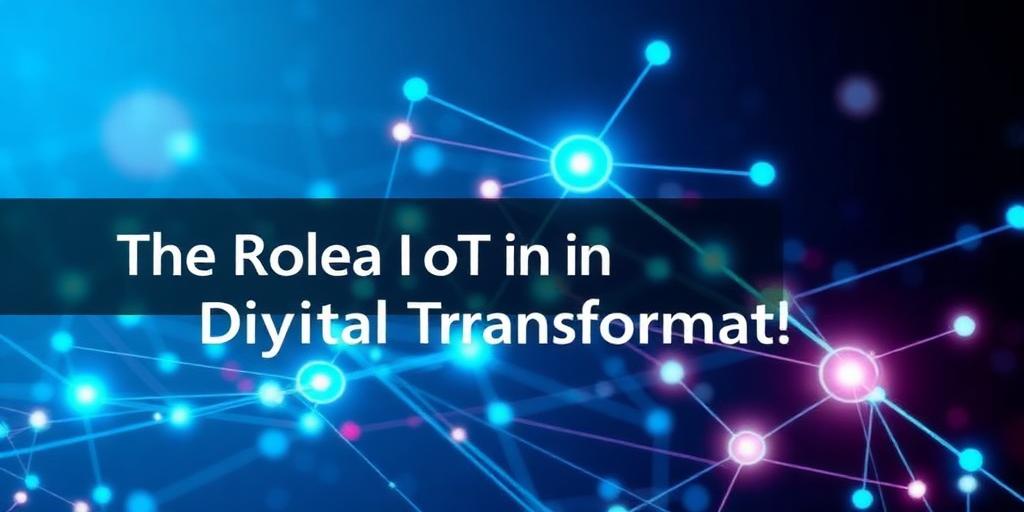Digital transformation is no longer a strategic option but a fundamental imperative for organizations aiming to thrive in the modern economic landscape. This pervasive shift involves the comprehensive integration of digital technology into all areas of a business, fundamentally altering how it operates and delivers value to customers. At the heart of this transformative journey lies the Internet of Things (IoT), serving as a crucial enabler and a powerful catalyst for innovation. Understanding the profound role of IoT in digital transformation is essential for any enterprise seeking to modernize its operations and unlock new competitive advantages.
The Foundational Role of IoT in Modern Enterprise
IoT refers to a network of interconnected physical objects—things—that are embedded with sensors, software, and other technologies for the purpose of connecting and exchanging data with other devices and systems over the internet. These 'smart' devices range from industrial machinery and smart city infrastructure to consumer wearables, all generating a continuous stream of actionable data. It's this data generation and subsequent analysis that positions IoT as a cornerstone of digital transformation initiatives.
Driving Data-Driven Decision Making
One of the most significant contributions of IoT to digital transformation is its unparalleled ability to generate vast quantities of real-time data. This deluge of information, collected from diverse sources such as manufacturing floors, supply chain logistics, and customer interactions, provides organizations with unprecedented visibility into their operations. By leveraging advanced analytics and artificial intelligence, businesses can convert this raw data into strategic insights. This enables more informed, data-driven decision-making, moving away from traditional, often anecdotal, approaches.
Enhancing Operational Efficiency and Automation
Internet of Things impact on business transformation is profoundly evident in operational efficiency. IoT devices facilitate the automation of routine tasks, monitor equipment performance, and optimize resource allocation across various sectors. For instance, in manufacturing, sensors on machinery can detect impending failures, enabling predictive maintenance and significantly reducing downtime. In logistics, IoT-enabled tracking systems provide real-time updates on inventory and shipments, streamlining supply chain management. This leads to substantial cost savings, increased productivity, and a more agile operational framework.
Revolutionizing Customer Experience
IoT empowers businesses to deliver personalized and highly responsive customer experiences. Smart products can collect usage data, allowing companies to understand customer behaviors and preferences more deeply. This understanding facilitates the development of tailored products and services, proactive support, and engaging interactions. For example, smart home devices can adjust environments based on user habits, and connected vehicles can offer personalized infotainment or maintenance alerts, thereby solidifying brand loyalty and satisfaction. Businesses are truly leveraging IoT for enterprise digital strategy to reshape how they engage with their clientele.
Unlocking New Business Models and Revenue Streams
Digital transformation is not merely about optimizing existing processes; it's about creating entirely new avenues for value creation. IoT plays a pivotal role here by enabling the shift from product-centric to service-centric models. Manufacturers can transition from selling products to offering 'as-a-service' models, where customers pay for usage rather than ownership, bundled with ongoing support and data-driven insights. This continuous engagement generates recurring revenue and fosters long-term customer relationships. The rise of IoT applications for modern businesses continues to demonstrate this potential for innovation.
Navigating Challenges and Ensuring Strategic Implementation
While the benefits are clear, successfully integrating IoT into a digital transformation strategy requires addressing several key challenges. These include ensuring robust cybersecurity, managing the immense volume of data, ensuring interoperability between diverse devices and platforms, and cultivating the necessary skill sets within the workforce. A comprehensive strategy must account for these factors, prioritizing security-by-design, scalable infrastructure, and a clear roadmap for implementation to fully realize the benefits of IoT in digital initiatives.
Conclusion
The Internet of Things stands as an indispensable pillar in the ongoing evolution of digital transformation. Its capacity to generate actionable data, enhance operational efficiency, personalize customer experiences, and foster innovative business models positions it as a critical component for enterprises navigating the digital age. Organizations that strategically integrate IoT into their core operations will not only achieve significant competitive advantages but also lay a resilient foundation for future growth and sustained innovation. The journey of digital transformation is inherently intertwined with the advancements and strategic application of IoT.









